
I
I
Was oppressively hot, and we found two or three cups of Lew Chew tea an
agreeable refreshment. Returning to the terrace, at the base of the outer
wall, we halted in the shade to allow the men their mid-day rest and meal.
A flight of steep steps, cut in the rock, led downward on the northern side to
a grotto under the foundation of the castle, at the bottom of which was a
pool of cold, sweet water. The place was completely overhung by dense foliage,
and inaccessible to the beams of the sun.
While our meal was preparing, Mr. Jones traced out a rough plan of the
fortress, and the men took measurements.
The material was limestone, and the masonry of admirable construction,
the stones, some of which were cubes of four feet square, were so carefully
hewn and jointed that the absence of any mortar or cement did not seem to
impair the durability of the work. There were two remarkable points about
the work. The arches were double, the lower course being formed of two
stones hewn into almost a parabolic curve, and meeting in the centre, over
which was the regular Egyptian arch, with its key-stone, as represented in
the annexed outline, No. 1.
The other peculiarity
was, that in place of bastions,
there were square
projections of masonry,
presenting a concave front,
(No. 2,) which would catch
and concentrate the force
of a cannon ball, rather
than ward it off. But this
fortress must have been
erected many centuries before
the use of fire arms of
any kind could have been
known to the Lew Chew-
ans. Our Chinese pretended
to give the name of
the place as Ching- King, whieh are Chinese words, signifying the chief or
capital citadel.
We resumed our march at half past one o’clock. The old Pe-ching
“ Chang-Yuen,” who had become a little fatigued by this time, took a ka-goo,
or Lew Chew chair, and followed in our rear, leaving the particular charge
of us to his subordinates. The scouts were sent ahead, as usual, for our path
descended again to the populous plain at the base of the hills. We already
perceived indications of a fixed system in the espionage to which we were subjected.
Chang-Yuen and his two secondary officers were deputed to accompany
us during the whole journey, while their dozen or more attendants and